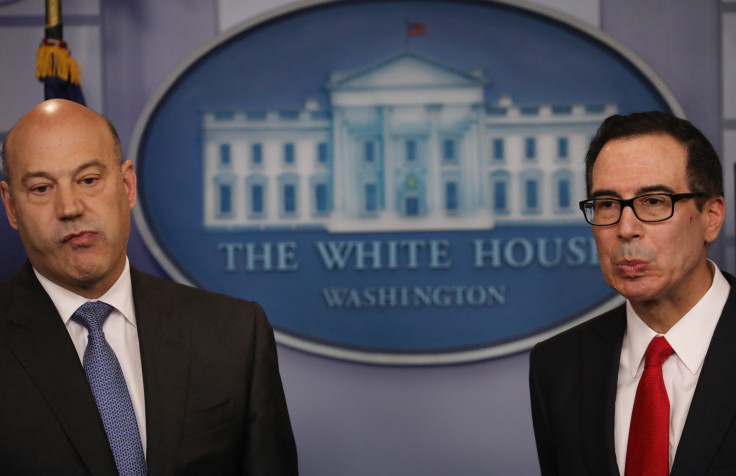Winners And Losers In Trump Tax Plan: Effective Rates For Facebook, DuPont, Others, Often Negative, Study Says

President Donald Trump’s proposal to drop the corporate tax rate to 15 percent from 35, which Treasury Secretary Steven Mnuchin and National Economic Council Director Gary Cohn announced at a press conference Wednesday, may sound like a tremendous leap, but in reality, many firms — including Facebook and Boeing — already pay far less than the statutory rate.
Companies in the United States face, on average, what is ostensibly the third-highest corporate tax rate in the world, right behind the United Arab Emirates and Puerto Rico, according to the non-profit Tax Foundation. What those corporations actually fork over every year, however, is much smaller.
On the state level, 240 Fortune 500 firms avoided paying $126 billion in income taxes between 2008 and 2015, a study released Thursday by the non-profit Institute on Taxation and Economic Policy found. Of those 240 companies, 92 avoided state income taxes for at least one year during that period, and 49 paid no state income taxes for multiple years. (The institute examined 258 firms, and 240 made their state and local tax data available.)
Some companies, such as Facebook, DuPont, Boeing, Merck and Eli Lilly, paid negative effective state tax rates for several of those eight years through rebates, credits or deductions, ITEP found.
While state corporate tax rates, on paper, average at about 6.25 percent, according to the report, those firms—all of which were profitable during the period they were studied—paid an average rate of 2.9 percent. The study followed a similar report released by ITEP in March that pegged the average effective federal corporate tax rate, which Mnuchin and Cohn said would be slashed Wednesday, among 258 Fortune 500 companies at just 21.2 percent.
A March report from the Congressional Budget Office using 2012 data more or less confirmed these disparities, while comparing statutory tax burdens shouldered by American companies to those of other countries in the Group of Twenty, or G-20, a consortium of developed nations.
Although in theory the U.S. stood at the top of the list in terms of average combined state and federal corporate taxes, at 39.1 percent, it came in fourth when taking loopholes and subsidies into account, with an 18.6 percent rate.
Corporate profits, meanwhile, have generally been on the rise. Just over three years ago, they hit their highest level in more than eight decades. After dipping slightly in 2015, they grew 22 percent between the final quarters of 2015 and 2016.
Trump's plan is widely expected to accelerate the trend.
In addition to winding down the statutory rate, the proposal called for a tax on the profits American corporations hold offshore, but would incentivize the return of those sheltered profits overseas with the promise of, as Mnuchin described it in the Wednesday press conference, “a very competitive rate that will bring back trillions of dollars.” The Treasury secretary, who spent 17 years at Goldman Sachs, assailed the corporate rate in its current form, citing it as a reason companies hold many of their profits outside the U.S.
“It is perhaps the most complicated and uncompetitive business rate in the world,” he said. “Not a surprise that companies leave trillions of dollars offshore.”
© Copyright IBTimes 2025. All rights reserved.






















